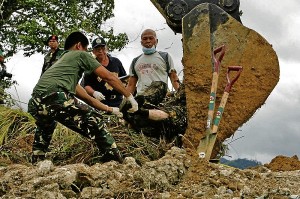Slow pace of Maguindanao trial symbol of impunity in PH – lawyer
DAVAO CITY, Philippines – For a case that captured the attention of the world, the trial of the accused in the 2009 Maguindanao massacre has taken on too long and has become a symptom of impunity in the Philippines, militant groups said when asked to reflect on the third year anniversary of the slaughter.
“If you want to see the state of impunity in the country, just look at the Ampatuan massacre case,” Bayan Muna Rep. Neri Colmenares said in a recent visit to Davao City, referring to the slaughter of 58 people, 32 of them journalists in Barangay Salman, Ampatuan town in Maguindanao on Nov. 23, 2009.
“Look at how it is doing now, for the length of the trial, people’s attention dissipates, people lose interest, documentary evidence lost, memory blurs and public interest wanes,” he said.
“For a crime that captured the attention of the world, the trial is already too much delayed,” he said.
Information from the National Union of Journalists of the Philippines (NUJP) has shown that three years after the massacre, 93 of the 196 accused still remain at large. Of the 103 suspects arrested, one committed suicide and the rest were detained at Camp Bagong Diwa and Camp Crame.
Article continues after this advertisementBy the rate that the trial is going, the NUJP estimates the trial could take 24 years before reaching a verdict.
Article continues after this advertisementThe NUJP also noted that at least 130 motions have been filed by the defense panel, stalling case proceedings. Three years after the massacre, not one among the accused has been convicted yet.
The NUJP said 28 of the accused have not been arraigned, while 55 have filed petitions for bail. Of the 28 accused bearing the surname Ampatuan, 17 are still at large; and among those who are detained, only two were arraigned.
Lawyer Karlos Isagani Zarate, convenor of the Alliance Against Impunity and secretary-general of the National Union of People’s Lawyers, said at the rate the trial has been going , it could take even longer than 24 years to reach a verdict.
At this point, justice remains elusive, according to Zarate.
“It speaks volumes of the maladies ailing the country’s adversarial justice system. It also speaks volume on why impunity is still sweeping our country today despite the much ballyhooed ‘tuwid na daan’ (straight path) of the present administration,” he said.
Private armies and the militias of the political warlords continue to roam around not only in Mindanao but also in many other parts of the country, according to Zarate.
“It can only mean that the Aquino administration is ‘inutile’ or it simply tolerates them for its own purpose. It’s the people who will be decisive in seeking justice, not only for victims of the Ampatuan massacre, but also the rest of the victims of impunity in the country,” he said.
The international watchdog Human Rights Watch (HRW) has repeatedly called the attention of the Aquino administration for its failure to disarm and “demobilize” militias and paramilitary forces and private armies responsible for the massacre three years ago.
“The slow pace of the Maguindanao Massacre trial and the government’s failure to arrest nearly a hundred suspects raise grave concerns for the safety of witnesses and for obtaining justice for the victims,” the HRW said in a statement.
“Three years since the horrors of the Maguindanao Massacre, the trial crawls along, half of the suspects remain at large, and the victims’ families still face threats,” said Brad Adams, Asia director at Human Rights Watch. “Yet the larger problem is that the Aquino administration has done next to nothing to disband the rest of the country’s private armies.”
